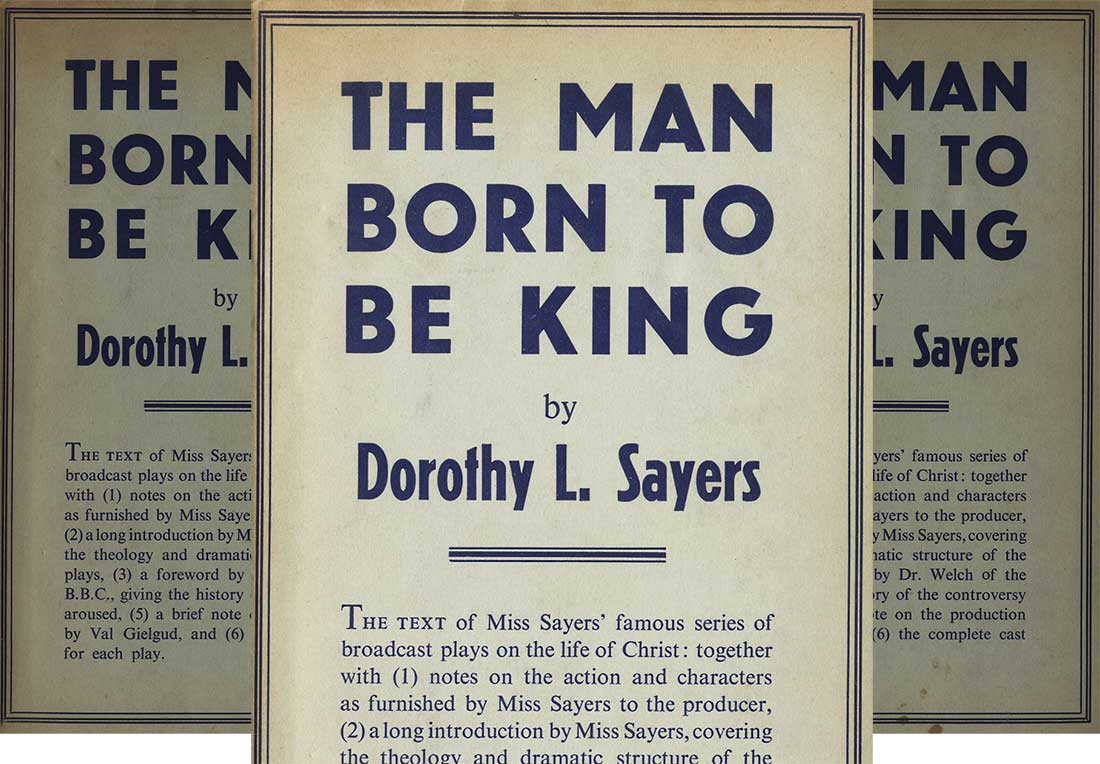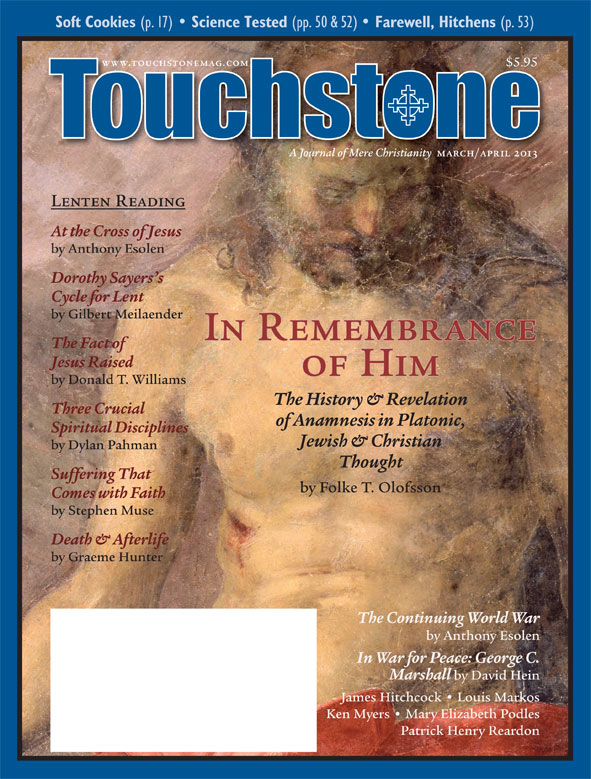Veiw
The Greatest Drama Ever
Gilbert Meilaender on Reading Dorothy Sayers's Play Cycle for Lent
On June 4, 1955, C. S. Lewis wrote to Dorothy Sayers to thank her for a pamphlet and letter she had sent him. He noted, in passing, that "as always in Holy Week," he had been "re-reading [Sayers's] The Man Born to Be King. It stands up to this v. particular kind of test extremely well." We might, I think, do far worse than imitate Lewis in our own Lenten reading.
The Man Born to Be King is a series of radio plays, twelve in all, dramatizing the life of Jesus from birth to death and resurrection. First broadcast by the BBC in 1941–1942, they were published in 1943, together with Sayers's notes for each play and a long Introduction she wrote recounting both her aims and approaches in writing the plays and some of the first (often comical) reactions from the public.
Sayers did not suffer fools gladly, and she takes evident delight in recounting objections, many of which grew out of a kind of piety that resisted the deliberate realism of the plays. Thus, for example, among those who wrote her with objections was one who objected to her having Herod tell his court, "Keep your mouths shut." The reason for the objection? Such "coarse expressions" struck the correspondent as "jarring on the lips of any one 'so closely connected with our Lord.'"
Of course, some of the objections can be better understood and may seem less comical if we note how much has changed since the plays were first broadcast roughly three-quarters of a century ago. Sayers notes in her Introduction that British law at the time prohibited "the representation on the stage of any Person of the Holy Trinity"—and this, in turn, encouraged listeners to think of Jesus in ways that could scarcely do justice to his genuine humanity. Therefore, while observing within Christian sacred art "a dialectic" that emphasizes sometimes the incarnation of the eternal Word in Jesus, and other times the "scandal of particularity" in Jesus the first-century Jew, her plays tilt in the latter direction, toward a kind of realistic narrative. Jesus is, quite simply, the man born to be king.

There were, though, other difficulties confronting her that have not changed much over time. For the British public at the time she wrote—but also, in many cases, for us today—the Gospels were known chiefly "as a collection of disjointed texts and moral aphorisms wrenched from their contexts." This is, after all, the way we read them Sunday after Sunday. There is nothing wrong with doing so; indeed, there is much that is right about it. Still, it creates problems for the dramatist who aims to produce a story that is coherent in its overall trajectory and in its several episodes.
A Coherent & Arresting Telling
That is where the artist's skill and imaginative powers are essential, and, to my mind at least, Sayers is at the top of her form in these plays. Those who know her other writings will recall how insistently she argued that her task was to produce—as best she could—good work, plays that were truly good art. The theology implicit in the story and the religious impact of the events recounted would, she hoped, emerge from the story told, but her task was simply to tell that story in as coherent and arresting a fashion as possible. She had to develop the story through characters who, unlike us, do not know how it will end, and who could not, therefore, think in ways that might seem natural to us.
The plays may, therefore, call for some imaginative stretching on our part, but that stretching may also offer in turn a considerable theological payoff. In particular, it may keep Christians from a mistake they have often made—supposing that the political and religious leaders responsible for Jesus' death had as their aim "doing away with God." That is not how Sayers tells the story. "We, the audience, know what they were doing; the whole point and poignancy of the tragedy is lost unless we realise that they did not."
Imaginative Readings
Gilbert Meilaender is the Duesenberg Professor in Christian Ethics at Valparaiso University. His books include Neither Beast nor God: The Dignity of the Human Person (Encounter Books) and Should We Live Forever?: The Ethical Ambiguities of Aging (Eerdmans). He is a Lutheran.
subscription options
Order
Print/Online Subscription

Get six issues (one year) of Touchstone PLUS full online access including pdf downloads for only $39.95. That's only $3.34 per month!
Order
Online Only
Subscription

Get a one-year full-access subscription to the Touchstone online archives for only $19.95. That's only $1.66 per month!
bulk subscriptions
Order Touchstone subscriptions in bulk and save $10 per sub! Each subscription includes 6 issues of Touchstone plus full online access to touchstonemag.com—including archives, videos, and pdf downloads of recent issues for only $29.95 each! Great for churches or study groups.
Transactions will be processed on a secure server.
more on lent from the online archives
more from the online archives
calling all readers
Please Donate
"There are magazines worth reading but few worth saving . . . Touchstone is just such a magazine."
—Alice von Hildebrand
"Here we do not concede one square millimeter of territory to falsehood, folly, contemporary sentimentality, or fashion. We speak the truth, and let God be our judge. . . . Touchstone is the one committedly Christian conservative journal."
—Anthony Esolen, Touchstone senior editor











